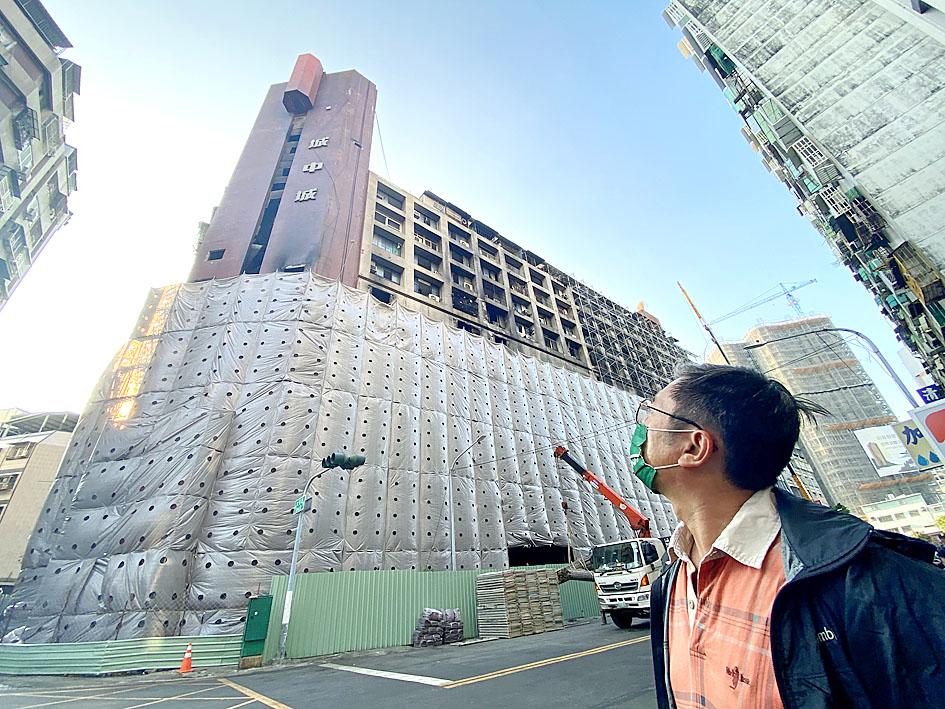The Executive Yuan yesterday approved proposed amendments to the Condominium Administration Act (公寓大廈管理條例) that would require more than 10,000 buildings to establish management committees by a deadline.
The changes were prompted by a fire at a 13-story older building in Kaohsiung in October last year that killed 46 people.
The proposed revision in Paragraph 1 of Article 29 would require that condominiums built around June 29, 1995, when the act was promulgated, set up a management committee or appoint a building manager if the building has been deemed a safety hazard.

Photo: CNA
The Ministry of the Interior said that 8,506 buildings built before the date have been deemed too old or a safety hazard, while more than 1,000 buildings constructed afterward would be affected.
The buildings affected could apply for an extension, but the period to set up a committee or appoint a manager should not exceed one year, the ministry said.
Other changes to the act would require local governments to stipulate a procedure or contractors to assist in managing the buildings, accelerate building maintenance and repairs, and regularly update fire safety equipment.
Each building’s committee or manager must register with the local authorities, the amendments say.
While the central government would soon issue a definition of “safety hazard,” local governments could expand the definition, the ministry said.
If a building cannot establish a committee or nominate a manager, local authorities should appoint one building resident to be the manager, the amendments say, adding that the resident would remain the manager until a committee is established or another resident is appointed.
Buildings that exceed the deadline would face a fine of NT$300,000, although the amendments say that the fine could be increased to NT$200,000 per resident per offense, Minister of the Interior Hua Ching-chun (花敬群) said.
The amendments are to be forwarded to the Legislative Yuan for review.

The first global hotel Keys Selection by the Michelin Guide includes four hotels in Taiwan, Michelin announced yesterday. All four received the “Michelin One Key,” indicating guests are to experience a “very special stay” at any of the locations as the establishments are “a true gem with personality. Service always goes the extra mile, and the hotel provides much more than others in its price range.” Of the four hotels, three are located in Taipei and one in Taichung. In Taipei, the One Key accolades were awarded to the Capella Taipei, Kimpton Da An Taipei and Mandarin Oriental Taipei. Capella Taipei was described by

EVA Airways today confirmed the death of a flight attendant on Saturday upon their return to Taiwan and said an internal investigation has been launched, as criticism mounted over a social media post accusing the airline of failing to offer sufficient employee protections. According to the post, the flight attendant complained of feeling sick on board a flight, but was unable to take sick leave or access medical care. The crew member allegedly did not receive assistance from the chief purser, who failed to heed their requests for medical attention or call an ambulance once the flight landed, the post said. As sick

The Taichung District Court yesterday confirmed its final ruling that the marriage between teenage heir Lai (賴) and a man surnamed Hsia (夏) was legally invalid, preventing Hsia from inheriting Lai’s NT$500 million (US$16.37 million) estate. The court confirmed that Hsia chose not to appeal the civil judgement after the court handed down its ruling in June, making the decision final. In the June ruling, the court said that Lai, 18, and Hsia, 26, showed “no mutual admiration before the marriage” and that their interactions were “distant and unfamiliar.” The judge concluded that the couple lacked the “true intention of

INDUSTRY: Beijing’s latest export measures go beyond targeting the US and would likely affect any country that uses Chinese rare earths or related tech, an academic said Taiwanese industries could face significant disruption from China’s newly tightened export controls on rare earth elements, as much of Taiwan’s supply indirectly depends on Chinese materials processed in Japan, a local expert said yesterday. Kristy Hsu (徐遵慈), director of the Taiwan ASEAN Studies Center at the Chung-Hua Institution for Economic Research, said that China’s latest export measures go far beyond targeting the US and would likely affect any country that uses Chinese rare earths or related technologies. With Japan and Southeast Asian countries among those expected to be hit, Taiwan could feel the impact through its reliance on Japanese-made semi-finished products and